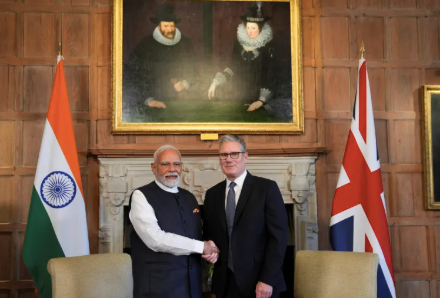Summary – The recently signed India-U.K. free trade agreement marks a pivotal moment with significant implications for Europe’s economic and geopolitical landscape.,
Article –
The recent signing of the India-U.K. free trade agreement (FTA) represents a monumental step with far-reaching implications, especially for Europe’s economic and geopolitical landscape. This historic pact, led by Indian Commerce and Industry Minister Piyush Goyal and signed in London, signals a significant shift in global trade dynamics.
Background
The India-U.K. FTA concludes years of negotiation aimed at boosting economic ties between two major economies. The agreement gained momentum following the United Kingdom’s departure from the European Union (EU) in 2020, prompting the U.K. to diversify its trade partnerships. For India, an emerging global economic powerhouse, the deal aims to increase exports, attract investments, and enhance manufacturing and technology sectors. Key elements include provisions on tariffs, market access, and cooperation in industries such as pharmaceuticals, agriculture, and services.
Key Players
The negotiation process was heavily influenced by:
- India’s Ministry of Commerce and Industry, led by Minister Piyush Goyal
- U.K.’s Department for International Trade, with strong support from the Prime Minister and trade secretaries
- Industry groups from both countries, including manufacturing associations, pharmaceutical firms, and technology companies
Meanwhile, European trade analysts and EU institutions are actively monitoring the FTA to assess its potential impact on European trade and industry.
European Impact
The FTA carries noteworthy political and economic consequences for Europe:
- Political: The deal underscores the U.K.’s post-Brexit assertiveness as a sovereign trade actor.
- Economic: It could reshape trade flows, supply chains, and competitive dynamics, notably affecting European exporters accustomed to preferential access through the EU.
Specific sectors such as textiles, automotive parts, and pharmaceuticals may experience heightened competition or new opportunities for collaboration. Additionally, the FTA may propel India’s deeper integration into alternative trade networks, challenging existing EU-led trade associations.
The agreement’s clauses involving intellectual property rights, digital trade, and sustainability standards may serve as benchmarks for European policymakers aiming to retain competitiveness and policy coherence within multilateral agreements.
Wider Reactions
The European Commission has adopted a cautious approach, emphasizing the protection of European businesses and compliance with existing standards. Several EU member states have expressed concerns regarding potential trade diversion and the necessity to engage more proactively with India to safeguard strategic sectors.
Experts stress the urgency for the EU to finalize its own long-delayed trade negotiations with India to avoid falling behind.
Neighbouring countries and regional blocs perceive the FTA as indicative of shifting global economic alliances, leading to re-evaluations of their trade strategies. The European Parliament highlights the critical balance between economic interests and broader geopolitical goals, such as joint action on climate change and technology regulation.
What Comes Next?
The India-U.K. FTA is expected to influence Europe’s future policy decisions in several ways:
- The EU may accelerate its trade talks with India to counteract competitive advantages gained by the U.K.
- European industries might seek partnerships with Indian firms to leverage new opportunities while managing potential market disruptions.
- The agreement could inform EU strategies on integrating standards for the digital economy, environmental protection, and inclusive economic growth in future trade deals.
Moreover, this development raises broader questions about Europe’s role in a multipolar trade world increasingly shaped by bilateral agreements outside the EU framework. The EU will need to consider whether to strengthen its internal trade cohesion or allow individual member states to pursue separate bilateral partnerships, potentially altering the bloc’s traditional balance of power.
As these changes unfold, the India-U.K. free trade agreement will remain a critical factor in Europe’s evolving economic and geopolitical equation.

More Stories
Why Brussels Is Watching India’s New Trade Model Amid EU-India Relations
Why Europe Is Watching India’s Trade Diplomacy Amid US Pressure on Agriculture
Why Dover’s Migrant Crisis Is Forcing Europe to Rethink Border and Migration Policies